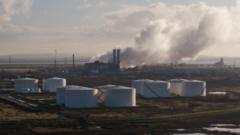Did British Gas Owner Just Make a £1.66bn LNG Terminal Buy?

The Sale of Grain LNG: A Strategic Move in the UK Energy Sector
The recent agreement for National Grid to sell its significant gas facility, Grain LNG, for £1.66 billion marks a crucial step in the UK energy landscape. This transaction involves a consortium that includes Centrica, the owner of British Gas, and Energy Capital Partners (ECP). While the sale awaits regulatory and governmental approval, it reflects a broader trend in the energy sector, aiming to streamline operations and focus on essential infrastructure. This article delves deeper into the implications of this sale for the UK's gas supply stability, energy security, and future energy policies.
The Importance of Grain LNG
Grain LNG is a pivotal facility located on the Isle of Grain in Kent, recognized as the largest LNG receiving terminal in the UK. Its primary function is to receive liquefied natural gas, a form of natural gas cooled to liquid for easier transport and storage. The facility plays a vital role in ensuring that the UK's gas supply remains stable, particularly during periods of high demand or supply disruptions.
With the increasing volatility in global energy markets, especially following geopolitical events like Russia's invasion of Ukraine, facilities such as Grain LNG are vital in maintaining energy security. They provide a buffer against price shocks and supply shortages, ensuring that consumers have access to energy when needed. This makes the sale of Grain LNG not just a financial transaction, but a strategic maneuver that could significantly impact the UK's energy landscape.
National Grid's Strategic Shift
National Grid's decision to divest from Grain LNG aligns with its broader strategy to focus more on electricity and gas networks. According to John Pettigrew, the company's chief executive, this sale is a continuation of their plan to streamline operations and concentrate on infrastructure rather than owning energy production sites. Earlier this year, National Grid also sold its renewable energy business, NG Renewables, reinforcing this strategic pivot.
This shift is indicative of a larger trend within the energy sector, where traditional utility companies are reassessing their roles in the evolving energy landscape. By divesting from assets like Grain LNG, National Grid can focus on enhancing the efficiency and reliability of the networks that transport energy to consumers. This aligns with the UK government's goals for a cleaner energy system by 2030, as the country aims to increase its reliance on renewable energy sources.
The Role of Centrica and ECP
Centrica's acquisition of Grain LNG adds a significant asset to its existing portfolio, which already includes the Rough gas storage facility, the largest gas storage site in the UK. This acquisition allows Centrica to exert greater control over gas supplies, an essential factor in ensuring stable energy prices and availability for consumers. Chris O'Shea, Centrica's chief executive, emphasized the strategic importance of Grain LNG in bolstering the UK's energy security.
The collaboration with Energy Capital Partners (ECP) further enhances Centrica's position in the energy sector. ECP specializes in investing in energy-related projects that facilitate the transition to cleaner energy sources. Tyler Reeder, ECP's president, expressed confidence that Grain LNG will serve as critical infrastructure for delivering reliable energy to local markets, underscoring the importance of maintaining stable import facilities in an era of energy transition.
Implications for UK Energy Security
As the UK government pushes for a significant increase in green energy sources, such as solar and wind, the role of natural gas in the energy mix remains crucial. While the long-term goal is to establish a clean power system by 2030, natural gas is expected to serve as a transitional fuel that complements renewable energy sources. Grain LNG's capacity to receive liquefied natural gas becomes increasingly relevant in this context, providing a necessary bridge as the country navigates its energy transition.
The acquisition of Grain LNG by Centrica and ECP also highlights the importance of strategic investments in infrastructure that can withstand market fluctuations. In light of recent global events, energy security has become a priority for governments worldwide. Ensuring a stable supply of natural gas through facilities like Grain LNG can help mitigate the risks associated with geopolitical tensions and supply chain disruptions.
Future Challenges and Opportunities
While the sale of Grain LNG may provide immediate benefits in terms of infrastructure stability and energy security, it also poses challenges. The UK energy market is undergoing significant transformations, and companies must adapt to changes in regulations, consumer preferences, and technological advancements. The transition to cleaner energy sources requires substantial investment in new technologies and infrastructure, which may strain financial resources for traditional energy companies.
Moreover, as the government implements policies to promote renewable energy, there will be increased scrutiny on the role of natural gas in the energy mix. Companies like Centrica and ECP must navigate these complexities while ensuring that they meet consumer demands for affordable and reliable energy. Continuous investment in innovation and sustainable practices will be essential in maintaining competitiveness in an evolving market.
Conclusion
The sale of Grain LNG represents a significant development in the UK energy sector, with implications for energy security, infrastructure investment, and the ongoing transition to cleaner energy sources. As National Grid refocuses its efforts on electricity and gas networks, the role of companies like Centrica and ECP becomes increasingly vital in managing the country's energy landscape. The ability to adapt to changing market conditions and invest in sustainable practices will determine the success of these entities as they navigate the complexities of the future energy market.
FAQs
What is Grain LNG and why is it important?
Grain LNG is the largest liquefied natural gas receiving terminal in the UK, located on the Isle of Grain in Kent. It plays a critical role in ensuring the stability of the UK's gas supply, particularly during high-demand periods or supply disruptions.
Who are the parties involved in the sale of Grain LNG?
The sale involves National Grid, which is selling the facility, and a consortium that includes Centrica and Energy Capital Partners (ECP), who are acquiring the asset.
What are the implications of this sale for UK energy security?
The acquisition of Grain LNG enhances the UK's energy security by providing stable gas supplies, which can help buffer against price shocks and ensure that consumers have access to energy when needed.
How does this sale align with the UK government's energy goals?
The sale aligns with the UK government's goal of transitioning to cleaner energy sources by 2030 while recognizing the ongoing importance of natural gas as a transitional fuel in the energy mix.
As the UK navigates its energy transition, the role of infrastructure and strategic investments will be crucial in ensuring reliable energy access. How do you think the sale of Grain LNG will affect your energy prices and security in the long run? #EnergySecurity #NaturalGas #UKEnergyTransition
```Published: 2025-08-14 10:10:15 | Category: technology



